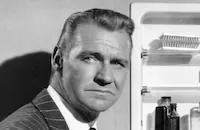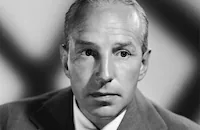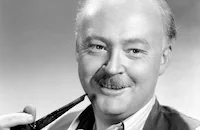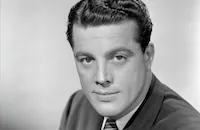Easy Living

Brief Synopsis
Cast & Crew
Jacques Tourneur
Victor Mature
Lucille Ball
Lizabeth Scott
Sonny Tufts
Lloyd Nolan
Film Details
Technical Specs

Synopsis
Veteran quarterback Pete Wilson, the star of the New York Chiefs, earns more money than any other player in football and is the toast of the town. Although Pete, who is known in the press as "King Football," has been suffering from dizzy spells and faints during practice one day, he refuses to see the team doctor. Instead he goes with his attractive wife Liza to a party that is being given by wealthy Gilbert Vollmer, a prospective client of Liza's struggling interior decorating company, Liza, Inc. Anxious to make a success of Liza, Inc., in which Pete has invested most of his salary, Liza flirts with both Gilbert and his father Howard. Pete leaves Gilbert's party and goes to one that his longtime friend and fellow player Tim "Pappy" McCarr is hosting in honor of their retiring college coach, Virgil Ryan. There Virgil tells Pete that, because of Liza's ambitious nature, Pete has been passed over as his replacement. Pete's disappointment over the job is heightened when he learns that Tim, who has always been his professional back-up, has been offered the post. The next day, Pete is told that his life insurance company has refused him a policy because of a heart condition its doctor detected during his physical exam. Posing as a salesman, Pete seeks a second opinion from heart specialist Dr. Franklin. Franklin deduces that Pete is an athlete and tells him that unless he wants to die early, he must quit football. Afraid that Liza will reject him for being a "has-been," Pete says nothing about his condition and continues to play. Later, after a particularly bad game, Pete learns from Tim that Virgil wants him to be Tim's assistant coach, but the proud Pete immediately rejects the offer. Liza, meanwhile, encourages the attentions of the philandering Howard, who tells her flatly that she has no taste or talent. When Howard suggests that he can buy her some "talent" and become her "silent partner," the ever-ambitious Liza jumps at the idea. Eager to be with Howard, Liza then refuses to accompany Pete to his next game in Chicago. On the train to Chicago, Anne, the team's wisecracking secretary and Lenahan's widowed daughter-in-law, who has long been infatuated with Pete, confesses her love. After a lonely and depressed Pete allows Anne to kiss him, Anne is given a friendly lecture by Lenahan, the team's owner. Lenahan then lectures Pete about his poor performances and reveals that the other players have dubbed him "King Cripple." For the Chicago game, Lenahan, who is determined to reach the playoffs, replaces Pete with Tim, who leads the team to victory. While returning to New York, some of the players leave a pair of crutches in Pete's train compartment, and Pete slugs Tim in frustration. Later, Pete confides to Liza that he wants to become Tim's assistant, but Liza rejects the notion and announces she is leaving him. When a devastated Pete passes out while drinking at a bar, Anne comes to his rescue and takes him home. The next day, Pete, who confessed his heart condition to Anne while half-drunk, is asked to replace the slightly injured Tim in the next game. Anxious to win back Liza's affection, Pete eagerly accepts the challenge, angering both Anne and Tim, who has learned about Pete's heart from Anne. Liza, meanwhile, is stunned to read about the suicide of Howard's previous conquest, a model whose career he fostered, and realizes that he has already grown bored with her. Suddenly alone, Liza leaves a message for Pete, telling him that she still loves him and will be waiting for him at the game. The next day, Liza informs Pete that she is willing to be an assistant coach's wife, but insinuates that he could soon replace Tim as the head coach. Disgusted by Liza's unbridled ambitions, Pete slaps her, then announces to Lenahan and the team that he is quitting football because of his heart. After Lenahan tells him that he is greatest player he has ever known, Pete finds a weeping Liza, slaps her again and, with a passionate kiss, informs her that she is going to be an assistant coach's wife and nothing more.

Director

Jacques Tourneur
Cast

Victor Mature

Lucille Ball

Lizabeth Scott

Sonny Tufts

Lloyd Nolan

Paul Stewart

Jack Paar

Jeff Donnell
Art Baker

Gordon Jones

Don Beddoe
Dick Erdman
William "bill" Phillips
Charles Lang
Kenny Washington
Julia Dean
Everett Glass

James Backus
Robert Ellis

Steven Flagg
Alex Sharp
Russ Thorson
June Bright
Edward Kotal
Audrey Young
The Los Angeles Rams
Steve Bogarus
Leslie Horvath
Tom Fears
Fred Naumitz
Dante Magnani
Jack Banta
Don Paul
Howard W. Hickey
Gilbert J. Bouley
C. Fred Gehrke
Richard W. Huffman
Gerard Cowhig
Robert "buddy" Shaw
John Zilly
Gene M. Ruszkowski
Franklin Hubbell
Roger Eason
William L. Nelson
Carl Samuelson
John T. Martin
Bill Smyth
Milan Lazetch
W. J. O'brien
Gene Leslie
Robert Graham
Warren Schannon
Jackie Jackson
Alan Dinehart Iii
Brick Sullivan
Ray George
Dick Ryan
Steve Crandall
Albin Robeling
Erin Selwyn
William Erwin
Carl Saxe
Crew
James Almond
C. Bakaleinikoff
Gordon Bau
Robert M. Cowan
Russell A. Cully
Jim Curley
Albert S. D'agostino
Bill Dorfman
Joel Freeman
Lee Greenway
Carla Hadley
Alfred Herman
Alex Kahle
Dick Kinon
Frederic Knudtson
James Lane
Harley Miller
Clem Portman
Ralph Rainger
Leo Robin
Charles Schnee
Irwin Shaw
Kay Shea
Darrell Silvera
Nate Slott
Robert Sparks
Edward Stevenson
Charles Straumer
Roy Webb
Morris West
Harry J. Wild
Earl Wolcott

Videos
Movie Clip




Hosted Intro
Film Details
Technical Specs

Articles
Easy Living (1949)
Easy Living was a homecoming of sorts for the star. She had started her career at RKO Studios, rising from bit player to leading lady, before leaving for MGM in hopes of stardom. MGM hadn't known quite what to do with a beautiful slapstick comic, however. After a few years of stealing films in supporting roles and providing glamorous set dressing in their musicals, MGM let her go. But freelancing in late '40s Hollywood was hardly a picnic. With few decent film roles, Ball had signed on for a tour in Elmer Rice's hit comedy Dream Girl. The production brought rave reviews and whetted her appetite for working in front of live audiences, but when she was hit with an incurable virus shortly after the Los Angeles opening, it cut the production short, depriving her of a much needed career boost. Ball considered herself lucky to land her less than stellar role in Easy Living.
By this point, she had started appearing on radio to pay the bills. The head of CBS' radio network was impressed with her comic skills and began looking for a comedy series for her. When she turned down Our Miss Brooks, suggesting that her friend Eve Arden was better suited for the role of a wise-cracking high-school teacher, the network offered her the role of a bank executive's wacky wife in My Favorite Husband. The pilot was rushed onto the air with little fanfare because Our Miss Brooks wasn't ready, but it scored a surprise hit nonetheless. While the network started putting the rest of the series together, Ball returned to RKO for what would be her last film there.
Seven years earlier Ball had bid farewell to her RKO contract with Seven Days' Leave (1942), which also had paired her with Mature. At the time, however, her leading man, on loan from 20th Century-Fox, was angry that RKO hadn't borrowed his current girlfriend, Rita Hayworth, to star opposite him. He took out his disappointment on Ball, whispering obscene words to her during their love scenes and making lewd gestures just out of camera range. Many days she had fled to her dressing room in tears after the director called, "Print!" Mature was a little more settled on Easy Living, however, having recently married for the third time. His career would take off later in the year when Samson and Delilah became 1949's top-grossing film.
By the time Ball returned to RKO, the studio was also facing hard times. With Howard Hughes now its owner, the studio's star roster had dwindled since the days when Ball had been happy to support the likes of Katharine Hepburn, Ginger Rogers and Fred Astaire. Instead, the studio had only one bonafide star in Robert Mitchum, often borrowing actors like Mature and leading lady Lizabeth Scott (as Mature's greedy wife) to fill out its casts. Two first-class talents remaining on the lot were director Jacques Tourneur, the man behind such stylish films as Cat People (1942) and Out of the Past (1947), and cinematographer Harry J. Wild, who had shot such acclaimed films noirs as Murder, My Sweet (1944) and Cornered (1945). They helped give Easy Living a glossy surface that showed off Ball's and Scott's contrasting physical appeal effectively.
That wasn't enough for audiences, however, who found a football film that spent most of its time in locker rooms and apartments (Tourneur had never even seen a football game when he accepted the assignment) barely worth their time. Easy Living did poorly at the box office, though Ball could content herself with garnering the picture's best reviews. More important to her career, however, was the success of My Favorite Husband on radio and the better box office performance of another film she made in 1949, the slapstick comedy Miss Grant Takes Richmond, both of which pointed to her future as one of television's greatest comediennes.
Producer: Robert Sparks
Director: Jacques Tourneur
Screenplay: Charles Schnee
Based on the story "Education of the Heart" by Irwin Shaw Cinematography: Harry Wild
Art Direction: Albert S. D'Agostino, Alfred Herman
Music: Roy Webb
Cast: Victor Mature (Pete Wilson), Lizabeth Scott (Liza Wilson), Sonny Tufts (Tim McCarr), Lucille Ball (Anne), Lloyd Nolan (Lenahan), Paul Stewart (Argus), Jack Paar (Scoop Spooner), Jeff Donnell (Penny McCarr), Don Beddoe (Jaegar), Charles Lang (Whitey), Jim Backus (Dr. Franklin). BW-77m. Closed captioning.
by Frank Miller

Easy Living (1949)
Quotes
Trivia
Jacques Tourneur never saw a football game prior to working on this movie.
Notes
The working titles of this film were Education of the Heart and Interference. Education of the Heart was also the title of Irwin Shaw's unpublished story. In May 1948, Los Angeles Times announced that Jane Greer would be starring in this picture, the first since the birth of her baby. RKO borrowed Victor Mature from Twentieth Century-Fox for the production and Lucille Ball and Lizabeth Scott from Hal Wallis' company. Easy Living was the first film that Ball, who had been a contract player at RKO during the 1930s, made at the studio following a seven-year absence. According to Hollywood Reporter, June Bright, who plays the suicidal model in the film, was a model in real life, appearing on the covers of many magazines.
According to an unidentified July 1948 news item contained in the file for the film at the AMPAS Library, director Jacques Tourneur, a Frenchman, had never seen a football game before working on this picture. The same item notes that some scenes were to be shot at Wrigley Field in Chicago, IL. Kenny Washington, who plays "Benny" in the picture, was a former Los Angeles Ram halfback and was well known as the first of two African Americans to play for the National Football League. Woody Strode, who also became an actor, was the other.















